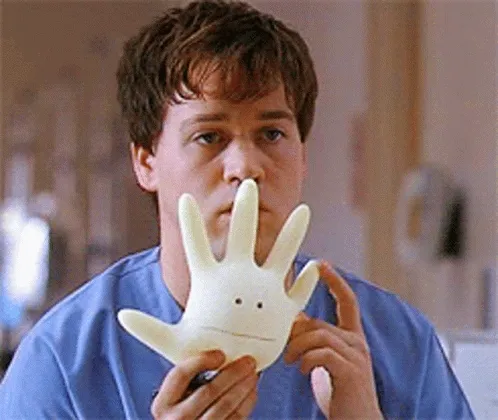How do providers feel about the way they’re portrayed on TV?
Some love it. Others…not so much.

ABC via Giphy
• 3 min read
Maia Anderson is a senior reporter at Healthcare Brew, where she focuses on pharma developments like GLP-1s and psychedelic medicine, pharmacies, and women's health.
Healthcare Brew enjoys a good medical TV show, whether it be a classic like Grey’s Anatomy or a more recent hit like New Amsterdam. Since we’re not exactly medical professionals (though we like to think we’re a notch above Dr. Google), we figured we’d ask people who actually work in the medical field about the way they’re portrayed on TV. Do they find it fun to point out the inaccuracies? Or are the depictions so inaccurate that they’re offensive?
As it turns out, the answers vary a lot by title.
The nurses we asked generally expressed unhappiness with the way their profession is portrayed on TV.
“I feel that shows like Grey’s Anatomy portray nurses as ‘less than,’” Diana Sorber, a community nurse at Rush Health in Chicago, told Healthcare Brew. “It is almost a disrespect for the doctors to be confused as nurses. They also take credit for the tasks nurses and other healthcare staff do, providing an inaccurate presentation of all healthcare staff.”
Terry Gallagher, an advanced practice nurse at Rush, agreed with Sorber’s sentiment.
“I’ll never forget watching the 2005 episode of Grey’s Anatomy when, the first time a registered nurse had a storyline, it was because she gave two surgeons syphilis. I wasn’t even in nursing school yet and I was appalled by how the nursing profession was portrayed in a show I loved. I stopped watching shortly after,” she said.
Julian Carranza, nurse manager for the adult emergency department at Novant Health Presbyterian Medical Center in Charlotte, North Carolina, told Healthcare Brew: “I feel sometimes the impact nurses have in real life is undermined in TV shows.”
The physicians we asked, on the other hand, didn’t seem as bothered by their portrayal in TV shows.
Navigate the healthcare industry
Healthcare Brew covers pharmaceutical developments, health startups, the latest tech, and how it impacts hospitals and providers to keep administrators and providers informed.
“Love anything that draws folks into healthcare to help people,” Jose Prince, chief of pediatric surgery at Cohen Children’s Medical Center in Queens, New York, told Healthcare Brew. “But I have to admit I enjoy catching the funny inconsistencies: the shoes left on a patient that would be totally naked in real life or the doctor not wearing a mask so you can see their face when we would all be masked. Life is too short to do anything but willingly suspend your disbelief and enjoy a good story.”
Vijay Agarwal, chief of New York City-based Montefiore Medical Center’s skull base and minimally invasive neurosurgery division (and medical consultant on Apple TV’s Severance), told Healthcare Brew he thinks the portrayal of healthcare professionals can be a positive thing, but it depends on how it’s done.
“Few mediums in our culture have the impact factor that TV and film do. These stories reach and inspire so many people. We have a duty to be careful and responsible with how [medical professionals are] portrayed,” Agarwal said. “Onscreen portrayal should reflect the noble, intense, altruistic, and at times brutal nature of medicine. When practitioners are portrayed as arrogant or callous, that does a disservice, as this is a small minority in the field.”
John Whyte, chief medical officer at WebMD, told Healthcare Brew he’s “glad to see we still often depict doctors as heroes and working tirelessly for a patient, but the amount of love dramas that take place...you’d think everyone is dating each other! It’s not quite like that,” he said.
To be fair, as Kaitlyn Hurst, an orthopedic surgeon at Novant Health, pointed out, “It would be pretty boring to watch all the hours of charting we do each day on TV.”
Navigate the healthcare industry
Healthcare Brew covers pharmaceutical developments, health startups, the latest tech, and how it impacts hospitals and providers to keep administrators and providers informed.